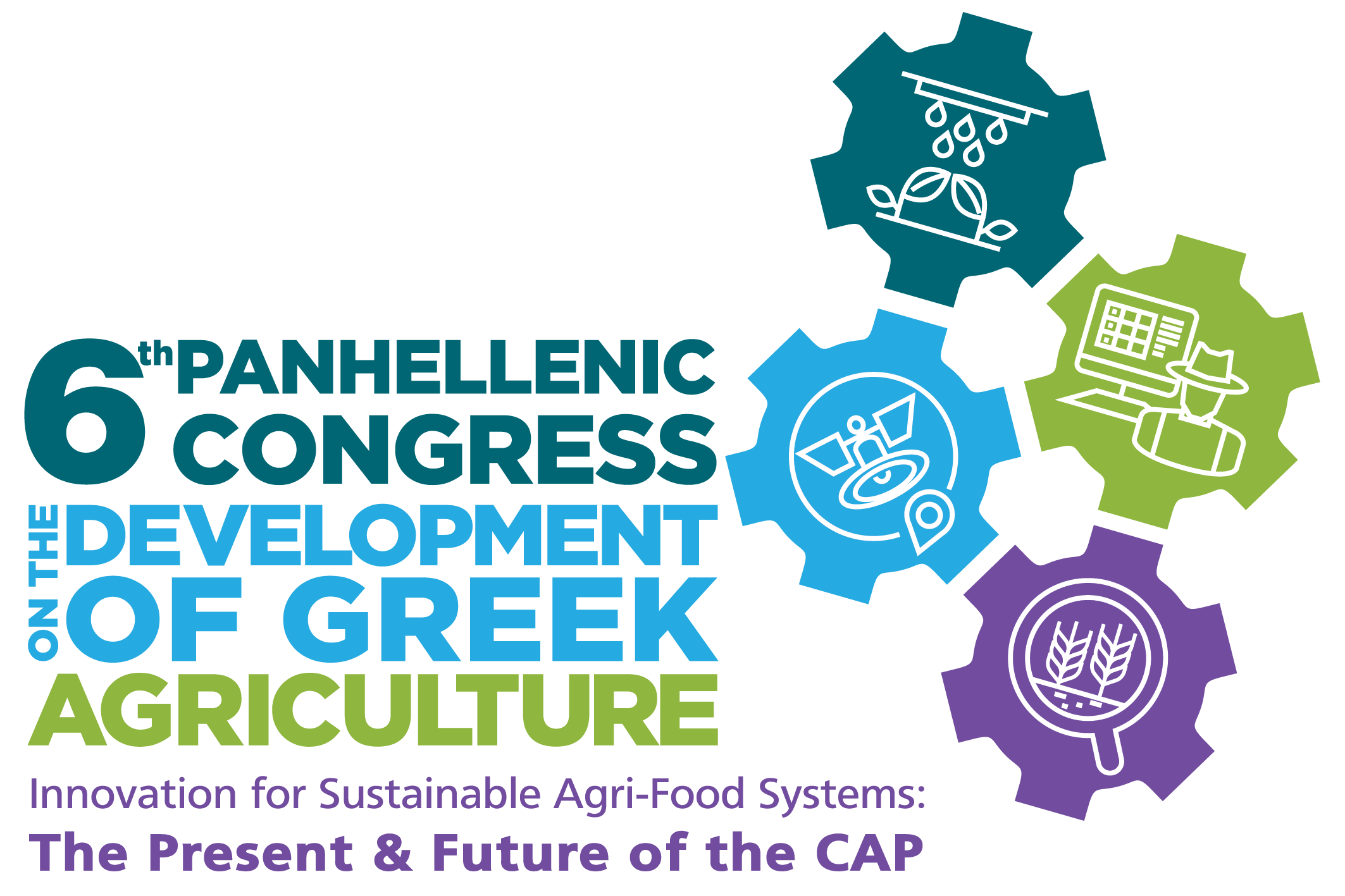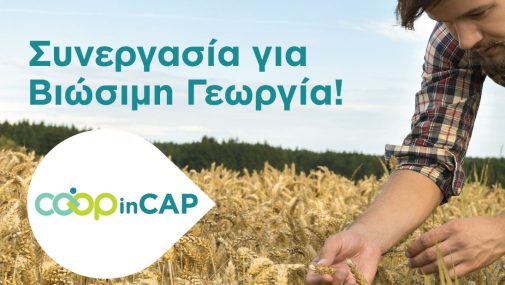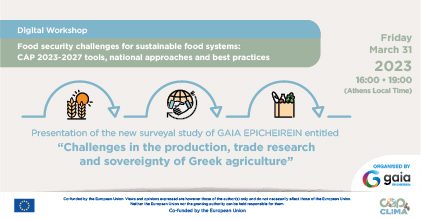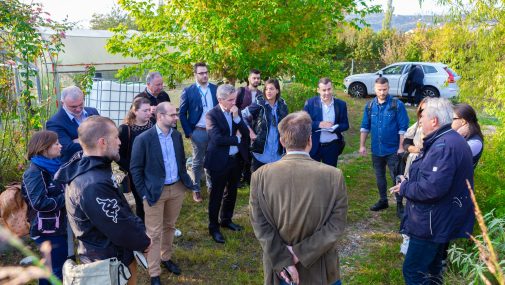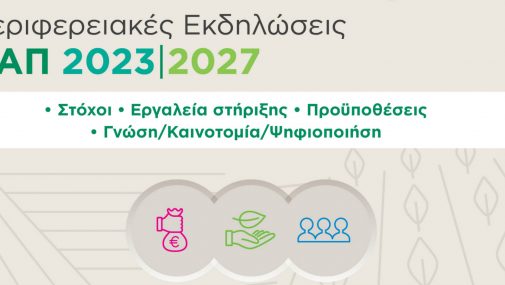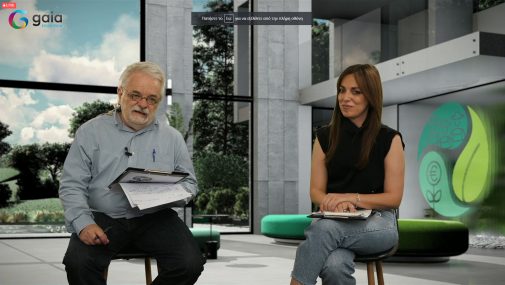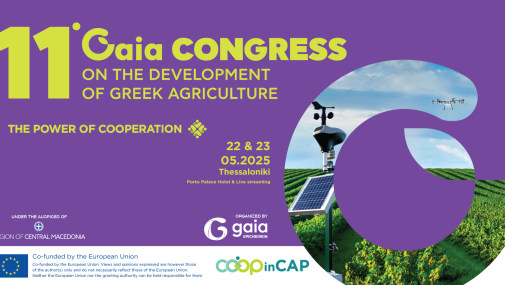This website uses cookies so that we can provide you with the best user experience possible. Cookie information is stored in your browser and performs functions such as recognising you when you return to our website and helping our team to understand which sections of the website you find most interesting and useful.
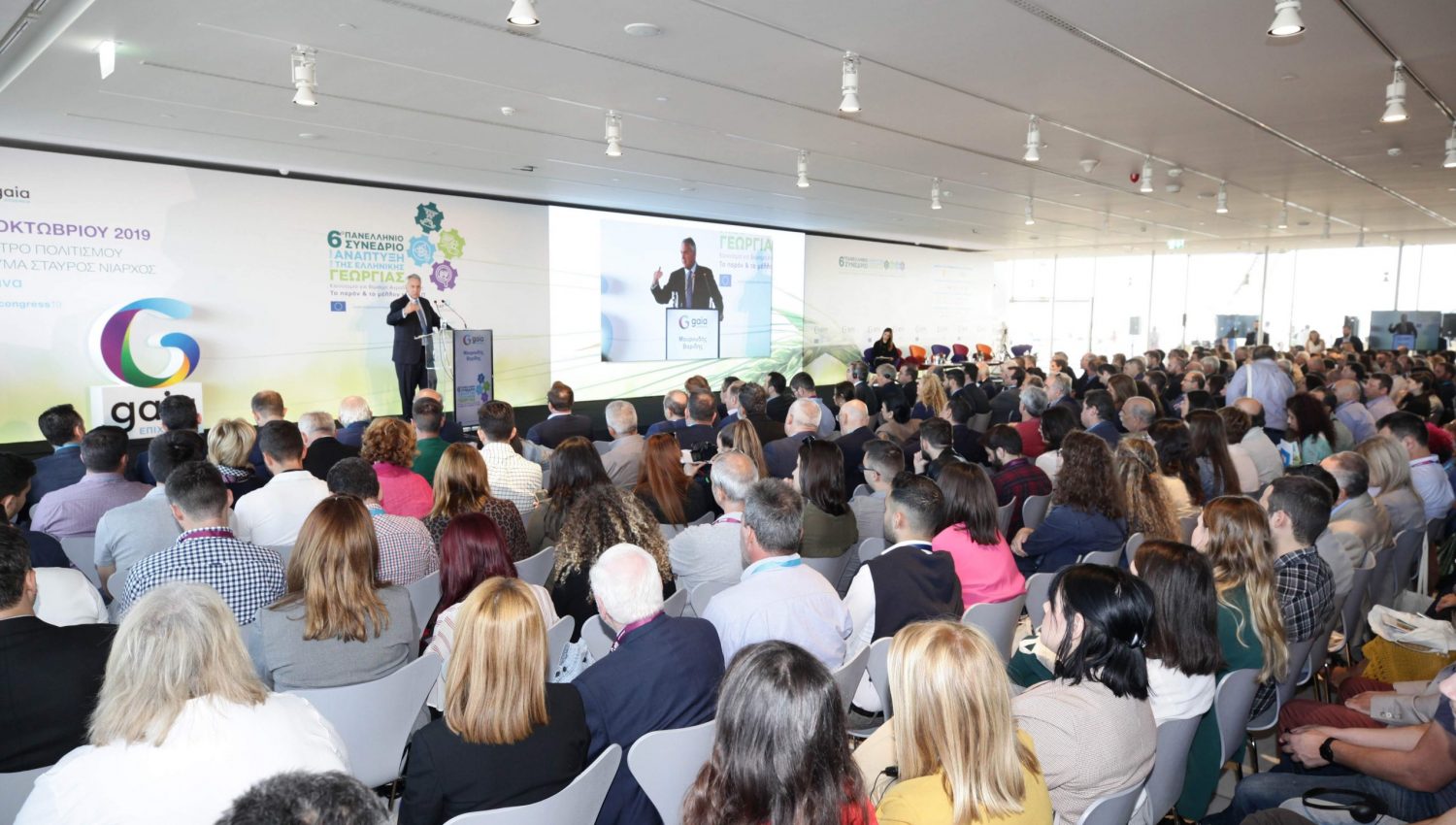
The 6thPanhellenic Congress on the Development of Greek Agriculture by GAIA EPICHEIREIN was successfully held in ‘Lighthouse’ hall of the Stavros Niarchos Foundation Cultural Centre, and attended by a multitude of participants and distinguished speakers from Greece and the EU. The subject of this year’s Congress was: ‘Innovation for Sustainable Agri-food Systems: The Present &Future of the CAP’, and it focused on the sustainability of the primary and broader agri-food sector, which is the most important European goal at the core of the future Common Agricultural Policy (CAP).
The first thematic session was moderated by the Director General of GAIA EPICHEIREIN,Elli Tsiforou, and the second by the Director of ‘Ypaithros Chora’ newspaper, Nikos Lappas.
Christodoulos Antoniadis, President of the BoD of GAIA EPICHEIREIN, declared the opening of the Congress and spoke about the important role of the Panhellenic Congress over the years. He also referred to the dynamism and openness of the agricultural cooperatives represented by GAIA EPICHEIREIN. Furthermore, he commented on the leading role of Piraeus Bank in Greece’s primary sector as well as to the leadership of NEUROPUBLIC IT company in terms of national and European efforts in digitising the primary sector.
Next, George Chatzinikolaou, President of Piraeus Bank, spoke of the new reality in the primary sector, and the requirements and challenges that Greek producers are being called upon to face. Their ally in this effort, he said, is Piraeus Bank, offering programmes and funding instruments that meet their needs. He stressed that Piraeus Bank will continue to lead the way, by supporting innovation and investments in the primary sector.
The third speaker of the day and keynote speaker of the Congress was Dacian Ciolos, President of the ‘Renew Europe’ Liberal Group of the European Parliament, former Prime Minister of Romania, and former European Commissioner for Agriculture. Mr Ciolos noted that the use of new technologies is not only recommended for larger holdings; it can be implemented in smaller holdings, making them more competitive, stressing the example of Greece with the implementation of the gaiasense smart farming system.
The floor was then given to Mr Ioannis Mavroudis, CEO of GAIA EPICHEIREIN, who referred to the major challenge of sustainability, which currently concerns the primary sector. He also referred to the extensive know-how and supporting services of ‘GAIA EPICHEIREIN’, as well as to the innovative tools and services NEUROPUBLIC has been developing. He stressed that “digitisation is a cross-cutting objective that is found in all general and specific objectives of the future Common Agricultural Policy (CAP)”.
The Minister of Agricultural Development & Food, Mavroudis Voridis, referred to the critical choices that Greece and the EU need to make in view of the new CAP, stressing the fact that Greece and other EU countries are against cuts in its budget. The Minister put forth a series of challenges and problems that the Greek primary sector is facing, and presented the initiatives of the government to support Greek farmers during its first months in office.
SYRIZA MP and former Minister for Digital Policy, Mr Nikos Pappas, referred to the importance of the emblematic Smart Farming project, which, as he said, is about to be implemented. He mentioned, inter alia, that the implementation of the project is expected to reduce production costs by 35% to 45%, depending on the crops.
In his speech, the Moderator of the Group for the Progressive Alliance of Socialists & Democrats on the Agriculture Committee of the European Parliament, former President of the Agriculture Committee of the European Parliament, former Minister of Agriculture of Italy, Mr Paolo De Castro, mentioned the danger of nationalising the CAP. He subsequently focused on the global challenge of climate change, which, as he stressed, demands a joint approach and change of course. On the matter of the budget, he noted that the European Parliament voted against any cuts in resources and in favour of strengthening the 2020 budget. He also stressed that there is a need for a transitional regulation which will extend the agricultural policy, and thanked GAIA EPICHEIREIN for the work it has done together with other national organisations to support the European Citizens’ Initiative EATORIGINAL.
The floor was then given to Mr Pekka Pesonen, the Secretary General of the agricultural cooperative organisations COPA-COGECA, who listed the challenges the agricultural sector is currently facing, the main one being that of the CAP budget; he also noted many important issues are yet to be clarified.
The Director of Sustainability & Income Support of the Directorate General for Agriculture of the European Commission, Mr Pierre Bascou, stressed the need for a transition towards an agricultural system that will transform challenges into opportunities through innovation and the exchange of knowledge with the support of the CAP. He also referred to the need to support actions for the environment and the climate within the designed CAP policy tools.
Mr Yves Madre, President of the FARM EUROPE think tank, concluded his speech by saying that the common ground of the CAP must be retained, while providing member states with flexibility in supporting their farmers. Mr Madre stressed that conditions throughout Europe are not the same, but that this should not lead to the nationalisation of the CAP. As he pointed out, the CAP must remain a common policy.
Mr Konstantinos Baginetas, Secretary General of Agricultural Policy & Community Resources at the Ministry for Rural Development and Food, mentioned that innovation is a cross-cutting objective in the 2014-2020 RDP. He presented the RDP Measures supporting innovation, collaboration, and advisory services. Specifically, he referred to M16 – ‘Cooperation’ and M01 – ‘Knowledge transfer’, in the framework of which actions have been planned for the transfer of knowledge and information in the agricultural sector. He also extensively referred to the importance of M02 – ‘Advisory services’ and informed participants that there would be developments regarding this measure in the coming days.
The Project Director of GAIA EPICHEIREIN, Mr Dimitris Kapnias, referred to the double role of sustainability in the new CAP, which concerns competitiveness of holdings and protection of the environment, stressing that innovation is here to solve the equation of sustainability with regard to both these parameters. He also referred to the modernisation of IACS, and pointed out that, according to surveys, Greek farmers indicate that they are the most satisfied farmers in Europe from their interaction with IACS. He also stressed that a new sustainable agricultural model should be based on generational renewal.
Fotis Chatzipapadopoulos, President of the BoD of NEUROPUBLIC, referred to the practical application of smart farming in Greece. He explained how people are the main players in this system, and not technology, as the system enables agronomists to collaborate with farmers. After describing the four dimensions of gaiasense (remote, field, eye, farm), Mr Chatzipapadopoulos analysed the implementation of the system in Rodopi cotton crops. He stressed that farmer practices improved, as farmers reduced pesticide spraying and used only the amount of water required for each crop. He pointed out that the implementation of the gaiasense system reduced production costs by 10-30%.
The speaker who closed the first part of the Congress was the Vice President of the BoD of GAIA EPICHEIREIN and President of the Union of Agricultural Cooperatives of Korinthia, Mr Christos Barlias. He noted the ominous economic situation in which Greek producers are called upon to become sustainable in view of the CAP reform. He then focused on the external convergence of Direct Payments, noting the particular characteristics of Greek holdings and highlighted the importance of training for cooperatives and their members. Mr Barlias also pointed out that inputs make up 55% of the production costs for Greek farmers and concluded: “we are waiting for the resources and tools that will support us in the sustainable transition”.
The second part of the thematic session entitled ‘Priorities & Policies for Sustainable and Innovative Cooperatives and Collective Agricultural Schemes’ began with Mr Umberto Di Pasquo, Senior Policy Advisor in COGECA, who stressed that cooperation is one of the most important elements for society and the economy and that the country with the highest number of recognised cooperatives is Italy. He also mentioned that cooperatives play a key role in the sustainability of the agricultural sector.
The floor was then given to Mr Spyros Antonopoulos, President of the Union of Agricultural Cooperatives of Argolida (REA), who stressed that cooperatives are not an ideological choice but an enterprise that brings together the interests of individuals in order for them to face common problems. He pointed out that we need to move on to a new type of agriculture that is based on knowledge and technology and that there are emblematic products of which we should be proud of. He concluded his speech by saying that cooperatives could act as the backbone for the agricultural sector’s growth.
The President of the BoD of ‘Pindos’ Poultry Cooperative, Mr Andreas Dimitriou, gave a detailed presentation of the said cooperative, which has been operating for 61 consecutive years with continuous success and growth. He then presented data that certify that the ‘Pindos’ Cooperative is the largest primary sector cooperative in Greece and the Balkans, with producers who have a guaranteed income and growth potential. It is noteworthy that the cooperative has been recording turnovers of more than 250 million Euros since 2016, with a steady upward trend and continuous investments. In view of the upcoming legislative regulations on cooperatives, Mr Dimitriou expressed his request to the government, stating: “we ask that cooperatives are given the capacity to operate in a competitive environment like all enterprises, big or and small, and that is why we believe that more independence from the State is required’.
Mr Ioannis Koufoudakis, CEO of NEUROPUBLIC, spoke of the new applications that the company has already developed for the agricultural sector, which will soon be on the market. He pointed out that these technologies concern the automatic identification of plots of land forecasting production and other practices that could benefit farmers. According to Mr Koufoudakis, these technologies fall into two categories. The first concerns how producers will access the said technologies. They are divided into direct access technologies, where producers have direct access to the service via their mobile phone, tablet or computer, and complex access technologies, where the assistance of a specialist is required for producers to benefit from the service.
Next, Mr Ioannis Kallias, CEO of ÜV AUSTRIA HELLAS / President of HellasCert, spoke about the importance of agricultural product certification as a main pillar of financial growth. Mr Kallias spoke of Greece’s leading role, with more than 100 PDO and PGI products, placing it among the top five suppliers of agricultural products out of 26 countries.
The final speaker of the 2ndthematic session of the Congress was Mr Alkiviadis Alexandrou, Deputy General Manager of the Agribusiness Sector at Piraeus Bank, who presented data that confirms the leading role of the bank in financing producers and cooperatives (30% market share in the banking sector and 87% market share in farmer operations). Next, Mr Alexandrou talked about the Bank’s complete, holistic philosophy vis-à-vis the agricultural sector, and presented some successful examples of collective schemes in Greece, noting the interest of Piraeus Bank in producer organisations that meet specific sustainability requirements. Mr Alexandrou also mentioned a series of current and planned banking products, noting that they can address all needs. To conclude, he stressed the pioneering and key interest of Piraeus Bank in the smart farming sector and in start-ups.
The congress ended with Mr Ioannis Mavroudis, CEO of GAIA EPICHEIREIN, thanking the participants and all those who helped organise and hold the congress.
CONGRESS SPONSORS
Gold Sponsor: Piraeus Bank
Major Sponsor: TÜV AUSTRIA
Sponsors: MEVGAL, COSMOCERT, TÜV HELLAS, INTERAMERICAN, STIHL
Supporters: AGROLAB RDS | BASF | UNION OF AGRICULTURAL COOPERATIVES OF SITIA | UNION OF AGRICULTURAL COOPERATIVES OF RETHIMNO | UNION OF AGRICULTURAL COOPERATIVES OF IRAKLEIO KRITI S.A. | AGRICULTURAL COOPERATIVE OF MESSOLONGHI AND NAFPAKTIA ‘ENOSI’ | UNION OF AGRICULTURAL COOPERATIVES OF MESSINIA | UAC OF IERAPETRA ‘ENOSI’| ASEPOP VELVENTOS | EASTH – AGRICULTURAL COOPERATIVE OF THESSALONIKI S.A. | AGRICULTURAL COOPERATIVE OF CHANIA | UNION OF AGRICULTURAL COOPERATIVES OF MERAMVELLOU | AGRICULTURAL COOPERATIVE OF SFAKIA | AGRICULTURAL COOPERATIVE OF OLIVE PRODUCERS OF THE MUNICIPALITY OF KANTANOU-SELINOU MUNICIPALITY | ASSOCIATION OF AGRICULTURAL COOPERATIVES – PRODUCER ORGANISATIONS OF THE PREFECTURE OF IMATHIA | AGRICULTURAL COOPERATIVE OF TYMPAKI | AGROANAPTYXIAKI DODEKANISOU
Communication Sponsors: Ypaithros Chora Newspaper | ypaithros.gr | I KATHIMERINI | Agro24 | Froutonea | Olivenews.gr | Elia & Elaiolado| larissanet NEWSPAPER | larissanet.gr | Eufori gi | NEA Kriti | neakriti.gr | KRITI TV | radio 98.4
